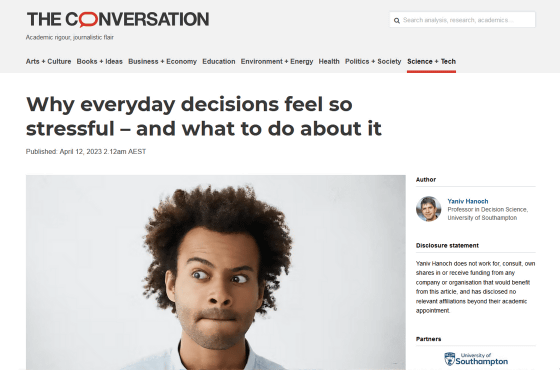Why is it that you get tired just by making small decisions on a daily basis? How can we reduce the stress associated with making decisions?

People are forced to make trivial decisions in every aspect of their daily lives, ``Do you want to stop the alarm snooze now and wake up or sleep a little longer?'' Or drink tea?”
Why everyday decisions feel so stressful – and what to do about it
https://theconversation.com/why-everyday-decisions-feel-so-stressful-and-what-to-do-about-it-200124

As to why even small, insignificant decisions in life can be exhausting, Hanoch said, ``First, the sheer number of options overwhelms us because it is difficult to compare and contrast options. There is,” he points out.
Economists once espoused the idea that the more options presented to people, the better. However, in 2000, American psychologist Sheena Iyengar and colleagues published research results that challenged this idea.
Iyengar and colleagues set up a jam tasting table at a supermarket and compared customer purchase rates when there were 6 flavors on the table and when there were 24 flavors. As a result, 30% of customers purchased jam when there were 6 flavors, but when the number of flavors increased to 24, the purchase rate decreased to only 3%.

The
This happens not only due to a simple lack of expertise, but also when the goals to guide us are vague. For example, if a person with only a vague goal of 'saving more money' is invited by a friend to 'let's go out to lunch,' there are clear criteria for deciding whether or not to accept the invitation. i don't have If it's not clear how sticky you are to your goals, you're more likely to struggle with choices.
There are also decisions that are seemingly insignificant but emotionally important, such as deciding what to wear on a date. 'Each factor is sufficient to create stress, but all factors combined amplify decision anxiety,' said Hanoch.

Hanoch also mentions two main decision-making strategies: 'maximize' and 'satisfy.' 'Maximize' refers to the tendency to find the best option, while 'satisfaction' refers to the tendency to end consideration when an acceptable option is found.
Which decision-making strategy to adopt depends on the person's personality, but

Hanoch recommends making choices a habit as a way to reduce the fatigue and stress of everyday decisions. ``Habits take the guesswork out of it,'' says Hanoch. Investing time in building habits stops you from repeating everyday decisions.
Nobel Prize winner in economics, Herbert Simon , who proposed the concept of 'satisfaction' in decision-making strategy, thought that human cognitive ability and attention are limited, so he created the idea of 'satisfaction'. matter. It seems that if you worry about this and that before you act, you may not be able to take action because you will be stressed and tired.
“You have to decide how to invest your cognitive, emotional, and physical resources,” says Hanoch. When it comes to making our day-to-day decisions, having fewer options makes the process easier.Apple co-founder Steve Jobs is known to have worn the same clothes (jeans and turtlenecks) almost every day, but this is to simplify the decision-making process, ”he said, learning habits and reducing choices. claimed to be the key to confronting everyday decisions.

Related Posts:
in Note, Posted by log1h_ik







